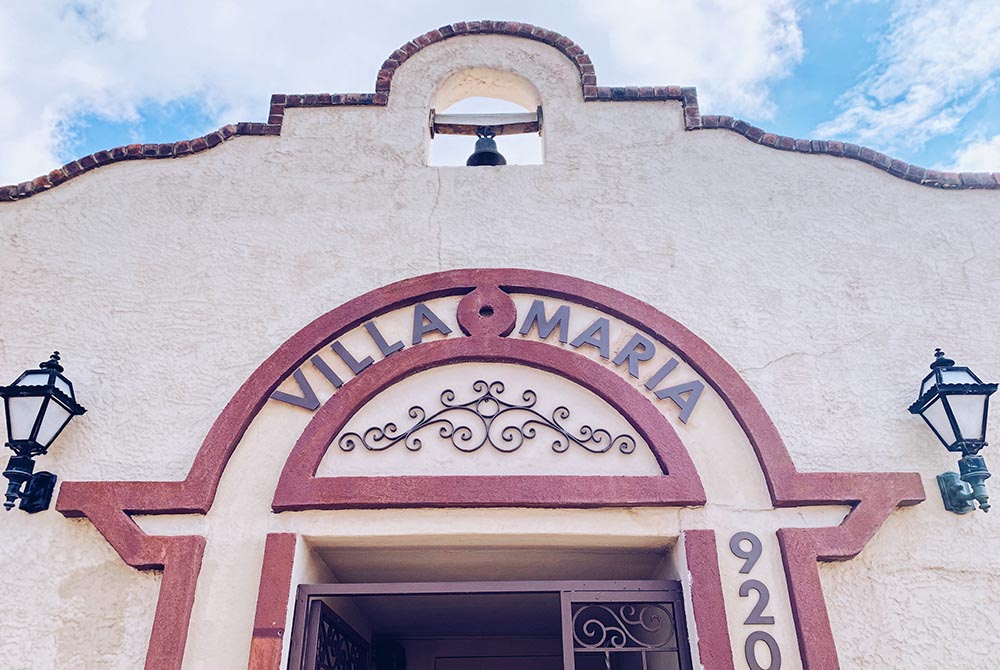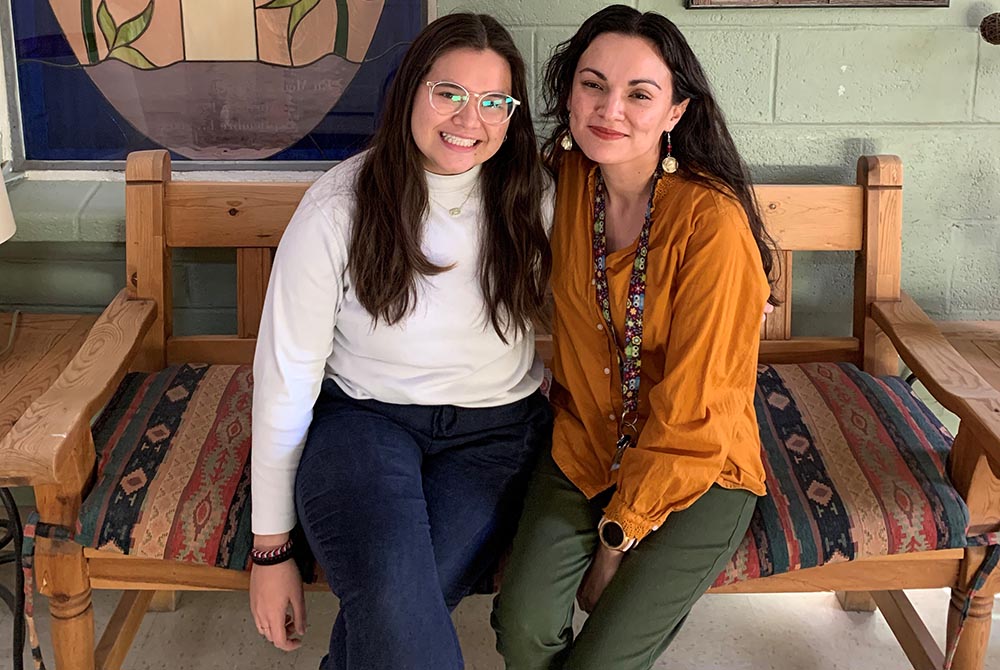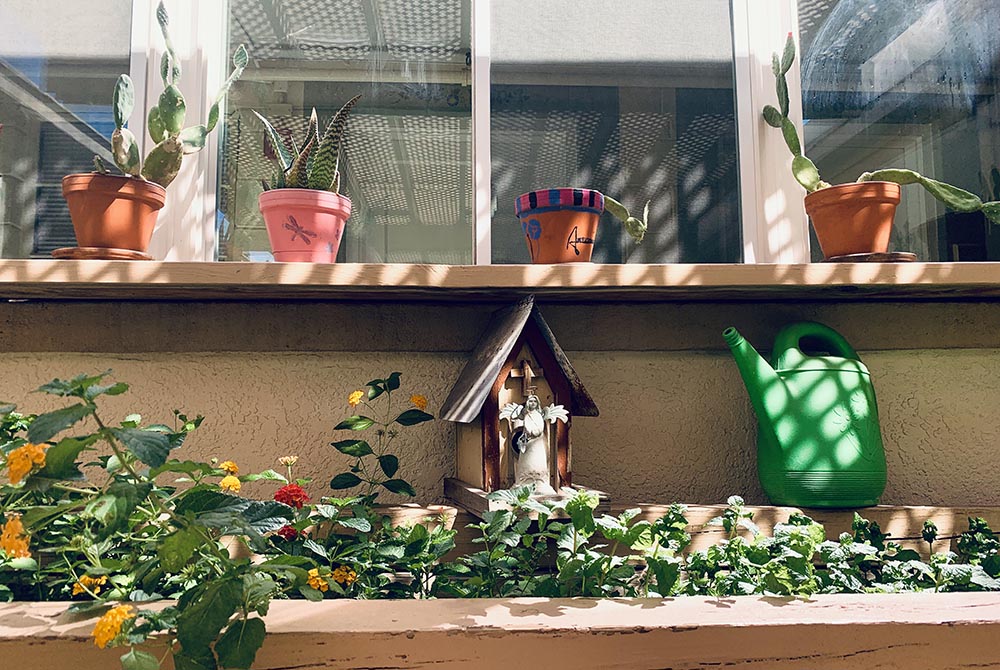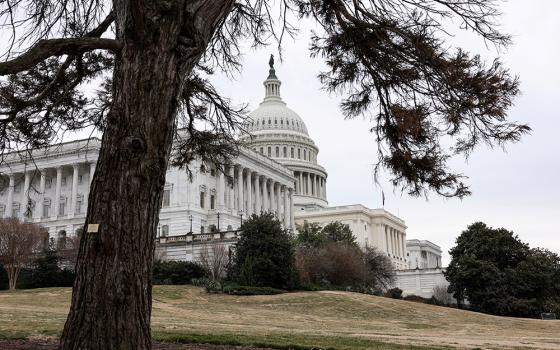
The front door into the Villa Maria shelter in El Paso, Texas (Provided photo)
Editor's note: Notes from the Field includes reports from young people volunteering in ministries of Catholic sisters. A partnership with Catholic Volunteer Network, the project began in the summer of 2015. This is our 11th round of bloggers: Celine Reinoso is a Loretto Volunteer in El Paso, Texas, and Maria Longo is a Notre Dame AmeriCorps volunteer in the Bronx, New York.
When the first cases of COVID-19 made their way into our news network, I found it hard to believe it would become the global pandemic it is now.
In mid-March, while I was still working my regular hours, the staff at Villa Maria felt disconnected from the possibility of obtaining cases at our shelter. We took precautions to disinfect and prevent unessential tasks that require a resident to leave the house, but we had not yet realized the gravity of the situation.
Two months later, and with more than 700 active cases of COVID-19 in El Paso, we have no choice but to accept the current state of the world and carry on doing the work we had started.
Villa Maria is a transitional homeless shelter for single women. We focus on creating a holistic program that can address physical, mental, spiritual and emotional needs through accompaniment and empowerment. My position as the Loretto Volunteer entails a social worker's lens to the fight for social justice and equity. I work alongside the shelter's case manager to aid individuals' transitions to self-sufficiency and stability from situations of crisis and homelessness.
Our residents come to us with multifaceted histories. Many have experienced domestic violence, abuse, addiction, and mental and physical health issues, and many experience racism and sexism regularly. While homelessness may be the first problem we address, our team understands this condition is just one aspect of a person's life. Providing temporary shelter for women at Villa Maria allows us to not only find permanent, stable housing for our residents, but also additional resources to address our clients' other intersecting, pressing and multidimensional issues or experiences.

Naomi, right, my supervisor and case manager at Villa Maria in El Paso, Texas, and me (Provided photo)
For one resident in particular, the two-week quarantine we established in March at the shelter was triggering for her as an addict in recovery. She had already felt trapped, as she was experiencing some level of verbal abuse from her family and isolation from other residents. The staff was able to recognize her need for special attention to help her out of a relapse. However, once we asked her to stay at home indefinitely because of government-mandated safety precautions, I can onlyassume she felt like we took the power away from her. This situation led her to make the decision to leave the shelter because of the lack of freedom she sought at the time.
We felt there was a different way for us to respond to this pandemic as a homeless shelter. A global pandemic and a stay-at-home order likely cause added anxiety to those who are already at the margins of society. I found myself wondering how it felt to be ordered to stay at home if a person felt like they didn't have a home in the first place.
It was difficult to figure out how to implement safety measures while also upholding the rights of the residents and respecting their needs. Part of the program is focused on having an intentional community. Each woman takes turns cooking for the whole house, and they all eat together every night. We had to change that practice to minimize human contact at the shelter. Unlike at many other shelters, our residents are free to go out and see their families, complete errands and explore the city, as long as they are back for house dinner. But because of the virus, we had to take away their right to go out except for work and appointments. Some of them even lost their jobs because of the shutdown, so they had no choice but to be stuck at the shelter.

Our little community garden in the patio of the shelter. (Provided photo)
Many of the women who live at Villa Maria come to us with nothing. They are often fleeing violence and abuse or have been recently incarcerated. We work with them to build their lives back up, find a job, save money, apply for public housing, go back to school, or even reunite with family. COVID-19 has added yet another level of obstruction for these women to achieve their goals.
With Texas reopening and public health concerns being slightly manageable, I am able to slowly go back to work once or twice a week. Now more than ever, I need to continue supporting our clients in their journey to self-sufficiency. There is a need for assistance in job search for those who don't have savings and had lost their jobs two months ago. Just because day-to-day activities look different now does not mean the end goal has changed. Public housing applications are opening, and I am called to continue to help our clients become stably housed.
It's nerve-racking, having to carry on with life and personal growth while prioritizing safety and well-being when an international health crisis is looming over all of our heads. But I remember the reason why I have persevered through my own journey and the reason I encourage our residents to, as well: Never let anything discourage your power to grow and achieve your goals — not even a global pandemic.
[Celine Reinoso is a Loretto Volunteer in El Paso, Texas, working at Villa Maria, a transitional homeless shelter for women.]
Advertisement






